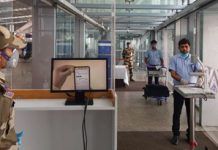Delhi Police, like many other urban police forces in western countries today, is becoming heavily armed and thoroughly computerised. The real-time analysis and critical response division in Delhi Police has its central processor at Police Control Room (PCR). The central processor eventually will perform “predictive policing”. The force has recently tied up with Department of Space to get real-time analysis of crime in the national capital. “We have also tied up for developing a mechanism for predictive policing,” Special Commissioner of Police Sundari Nanda said. She said that predictive policing is just one tool in this new, technology enhanced and data-fortified era of fighting and preventing crime.
On an average, the PCR receives 25,000 calls per day, out of which around 5,000 calls are actionable. With the help of Department of Space, Delhi Police will record every call through a software specially designed for the purpose, which have the ability to collect, store and analyse crime data and trends. In 2014, the PCR received 84,41,300 calls. “If at any moment we want to find which areas in the national capital are accident-prone and where snatching can take place in the next hour, the central processor can immediately locate those areas,” said Deputy Commissioner of Police S K Singh. The officer also said it will have the ability to identify crime hotspots.







